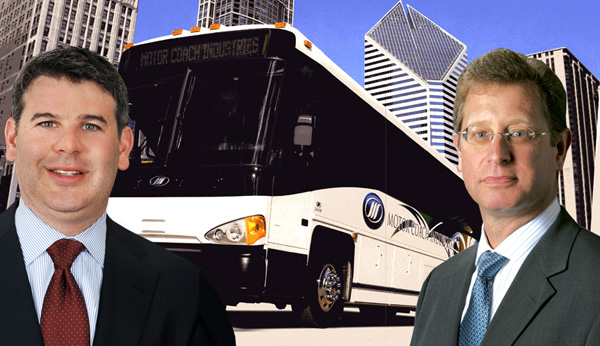
Motor Coach Industries moves into the future

KPS Capital Partners, New York, NY, announced in September it had taken controlling investment in MCII holdings, the parent company of Motor Coach Industries International (MCI), Schaumburg, IL. KPS has history investing in the transit industry. In 2002, KPS rescued Canada-based New Flyer, selling it in February 2004 with a 750-percent return on investment.
In the first week of November, Rick Heller was named MCI’s new CEO. In an exclusive BUSRide interview, Rick Heller and KPS Partner and MCI Chairman Jay Bernstein talk about MCI’s recent purchase and the future of MCI.
BR: What made MCI worth the risk and investment now for KPS?
Jay Bernstein: MCI is the greatest franchise in the motorcoach industry given its leading market share, an installed base twice the size of the nearest competitor and industry-leading national footprint in service and aftermarket support. Now that the vast majority of MCI’s debt has been eliminated, and with a new management team in place, the company is very well positioned to build on its industry leadership and become an even more valuable enterprise for all of its stakeholders.
The fact of the matter is the company had way too much debt, $800 million. A company in this industry dynamic, with the current depressed economic cycle, can’t afford that type of debt. We basically cleaned up the balance sheet and the company now has virtually no debt and is not faced with that huge interest expense and debt repayment burden. We are the only company whose sole focus is the North American motorcoach industry. I think the combination of having the really strong balance sheet and the exclusive focus will enable us to be the best supplier to the industry.
BR: Can you disclose the monetary details of the purchase?
Bernstein: We are not disclosing the financial terms of the transaction.
BR: What specifically attracted KPS to work in the past with New Flyer and now with MCI? What is attractive about the bus transportation industries?
Bernstein: KPS was attracted to this industry because of its good long-term growth prospects due to an aging population, which leads to greater bus ridership, increasing cost of owning and operating a car and improved environmental aspects of bus transportation. In addition, there are significant growth opportunities in the public sector. Furthermore, KPS was attracted to MCI’s outstanding franchise that can be further strengthened with a stronger financial position, which it now has, and access to KPS’s $2 billion in capital to fund growth.
BR: Can you expand more on those ‘significant growth opportunities’ in the public sector?
Bernstein: MCI really created the public sector market place for motorcoaches. I think it’s a matter of convincing more and more municipalities that this over-the-highway product works for their suburban population and getting people into the city center. Unlike the private side that this company has been selling for decades, this is a relatively new market.
There’s the ability to get into more transit authorities who have not really tried out the motorcoach product.
BR: Are you looking at acquisition opportunities for MCI?
Bernstein: Our sole focus right now is taking the company we have and working on making it better every day. Of course, going forward we will consider additional strategic opportunities. We have a very large fund, so we have the ability to invest additional money into this platform. But for right now our focus is on MCI.
BR: So you wouldn’t discount another motorcoach company purchase in the future?
Bernstein: It is really too early to speculate. I’m just saying that as a financial buyer we’ve certainly done it before. Down the road we would consider all opportunities.
BR: Was there hesitation to invest in MCI after Franklin Mutual Advisers handled the company for just over a year?
Bernstein: Franklin’s holding period was not a consideration in KPS’s investment process. KPS’s decision to invest in MCI was based on the strength of the company, its leading market share, the strong aftermarket support in the industry, the unmatched track record of its D and J coaches, its strong future growth prospects and the attractiveness of the industry.
BR: Was there a connection between the decision to invest in MCI and KPS’s past investment success with the sale of New Flyer in Winnipeg?
Bernstein: Certainly, KPS’s success in the New Flyer investment was instructive in considering and pursuing the MCI investment. As a result of its previous involvement, KPS has an excellent understanding of how the bus industry operates.
BR: Are you drawing on the success you enjoyed with New Flyer in the plan for MCI?
Bernstein: New Flyer is very relevant because there are a lot of commonalities. From New Flyer we have some perspective on the public market. But with all of our deals, we take the company and see how we make it better. Here, you have a company (MCI) with the large installed base that is very important to its private-sector and public-sector customers. That is one constituent group that wants this company to be as strong as it can be to support the fleet that is out there.
BR: The success of New Flyer was aided by contributions by the Province of Manitoba, and New Flyer’s suppliers, customers and lenders. Are you seeing the same support from entities connected with MCI?
Bernstein: The relationship between MCI and all of these parties is critical to everyone involved. KPS has an unparalleled track record in multi-constituency situations. The successful New Flyer transaction demonstrated this ability and is proof that building trust among key stakeholders is a critical component of success.
BR: Does KPS plan any more changes in upper management?
Bernstein: No others are planned at this time.
BR: Mr. Heller, what attracted you to come onboard with MCI?
Rick Heller: MCI has fabulous macro-fundamentals and is peerless in this segment of the industry. The company has great people that care deeply about the company and want to do what it takes to see it grow.
BR: What is your top priority as the new CEO?
Heller: We are very busy in a range of areas, but meeting with labor, vendors, governments and customers is a top priority and that process is well underway. It is very important to listen to their needs so that we build the best possible product and provide leading edge service and aftermarket support. At the same time, these stakeholders need to understand what we are trying to accomplish so that we have an open and trusting relationship with them. So far our discussions have been preliminary in nature, like introducing ourselves and getting to know one another. For me, it’s an opportunity to listen to them and understand what their needs and concerns are.
BR: Are major cost-cutting measures coming? Is dramatically improving company efficiency a priority?
Heller: Better managing costs and improving efficiencies are important priorities, and now that MCI has almost no debt the company is better positioned to invest in these areas.
BR: Does MCI have plans to develop new product lines in the near future?
Heller: MCI’s D coach is the best selling coach of all time and the workhorse of the industry. The J coach is the current best seller in the private sector. We have and will continue to improve these products. MCI’s product strategy is currently being reviewed and the company will make any product line changes or additions necessary to better serve customer needs. Given that KPS has really cleaned up the balance sheet, we have the flexibility from a financial standpoint to go make those investments now, where maybe in the past the company has not.
BR: With KPS’s involvement, are MCI’s struggles behind you?
Heller: The answer to your question is a resounding yes. MCI’s past struggles were driven by its large debt burden prior to KPS’s ownership. MCI has been profitable on an operating basis every fiscal year. Because of the massive interest MCI used to pay on its $800 million debt prior to bankruptcy, the company lost money on a net basis. Even after bankruptcy, the company’s interest expense was too large with $200 million in debt. That situation has now been fully rectified. MCI is now almost debt free and has access to KPS’s $2 billion of capital to fund future growth and innovation.
BR: Are workers coming back to work at MCI? Has employment increased? If not, will it in the future?
Heller: Employment has not increased at MCI. The struggling economy continues to negatively impact unit demand in the private sector. Until market demand picks up, it is going to be difficult to increase employment at the company.
BR: With KPS as a partner, can MCI customers be confident about the company’s future? What specifically can they look forward to?
Heller: MCI customers should be very excited about the company’s future. Our goal is to continually find ways to be the best possible supplier for our customers. That means building high-quality coaches, providing the best service and aftermarket support in the industry and continuing to innovate to meet our customers’ changing needs. Now that MCI is nearly debtfree, we have the financial flexibility to achieve these goals.
BR: What has the response been from suppliers? Has MCI lost any suppliers or notable customers since emerging from Chapter 11 in April 2009?
Heller: MCI is very pleased by the continued support from our customers and suppliers. We continue to do business with this network in a manner that benefits all parties. We are highly focused on being a great business partner to them.
BR: Are you confident MCI can return to its mid-1990s peak?
Heller: Yes. We will continue to build on the leadership position MCI holds in the North American motorcoach industry by continuing to improve the array of coaches it produces as well as the aftermarket support this company provides. Our customers will recognize these enhancements over time and I am confident that it will lead to an even stronger company. BR
